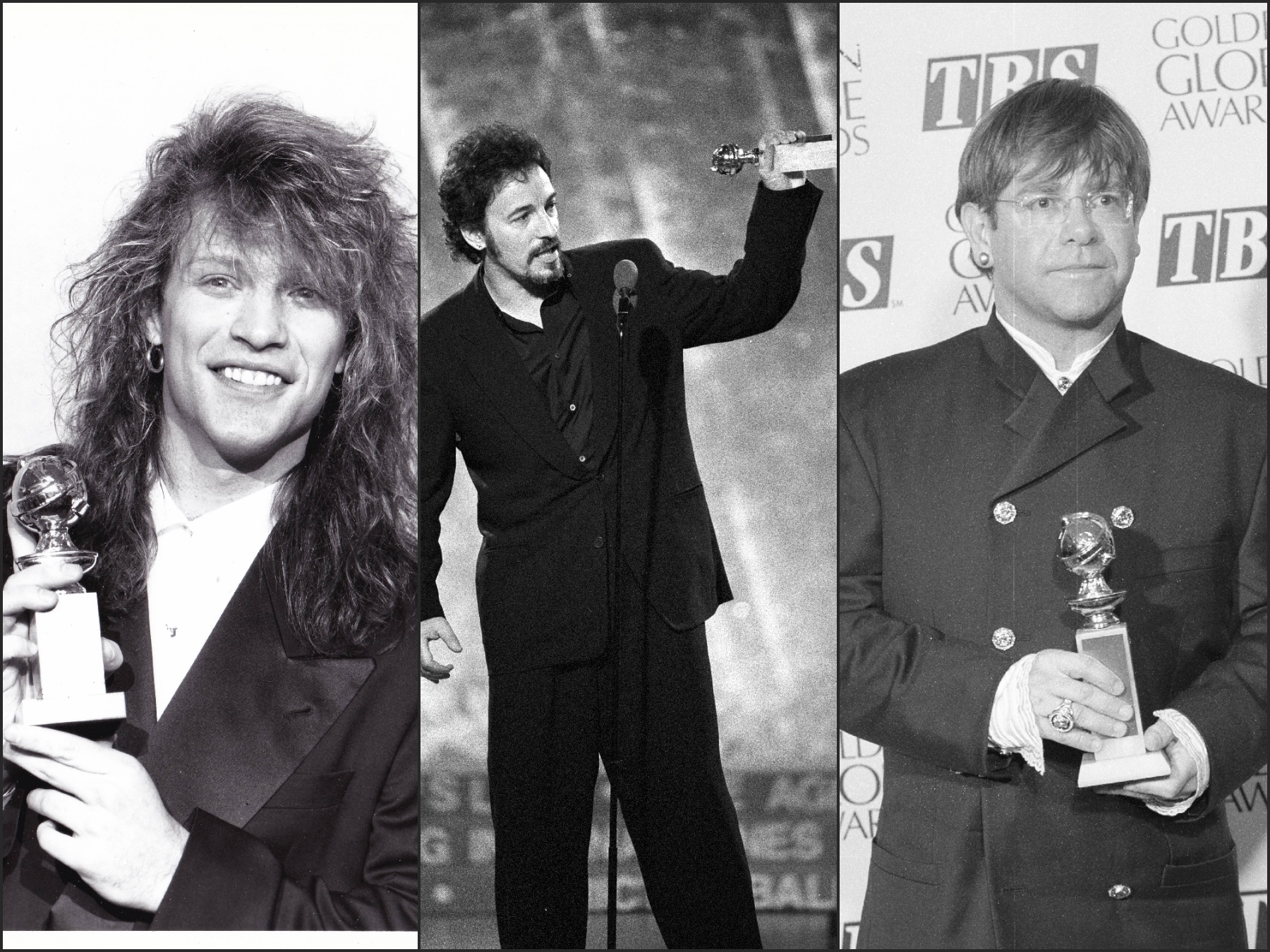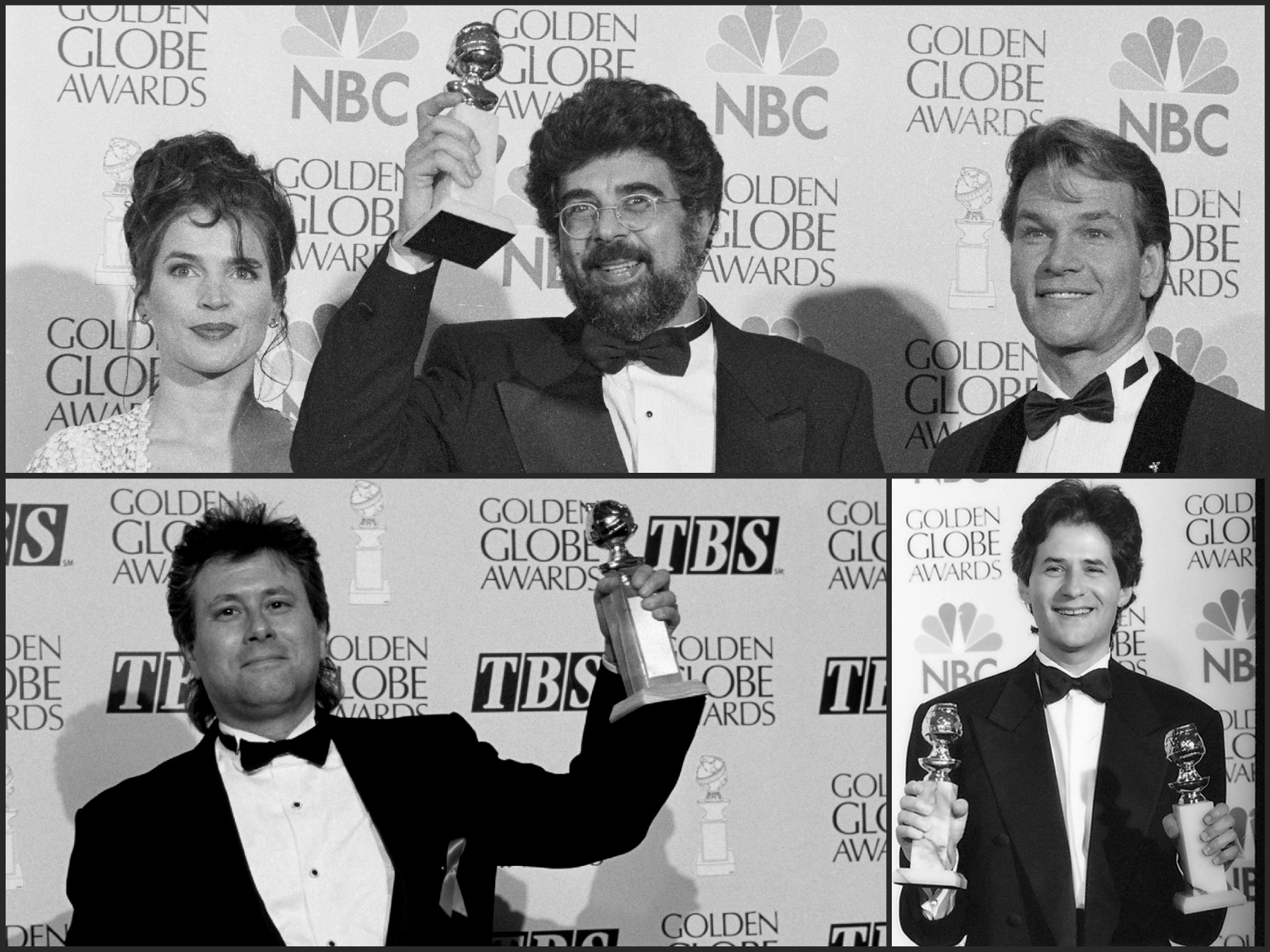
- Golden Globe Awards
Music and the Golden Globes: a Brief History – Part 3
Fin de siècle.Beginning with 1988 the Golden Globes and the Academy choices were mostly in sync. Both selected “I’ve Had The Time Of My Life” from Dirty Dancing as best song, and David Byrne, Cong Su, and Ryuichi Sakamoto’s The Last Emperor as Best Score. In 1989 both agreed on best song, Carly Simon’s “Let the River Run” from Working Girl, but, for Best Score, the HFPA chose Maurice Jarre’s Gorillas in the Mist, whereas the Academy preferred David Grusin’s Milagro Beanfield War.In 1990, consensus again: two Golden Globes and Oscars go to Alan Menken for the Disney animated film The Little Mermaid, one for Best Score and another for Best Song – ”Under the Sea” with lyrics by Howard Ashman. But in 1991, no consensus at all: the Hollywood Foreign Press gives its Best Song Golden Globe to Jon Bon Jovi for “Blaze of Glory from Young Guns 11, and the Academy honors Steven Sondheim for “Sooner or Later (“I Always Get My Man”) which he wrote for Warren Beatty’s Dick Tracy. As for Best Score, the Globe went to Richard Horowitz and Ryuichi Sakamoto for The Sheltering Sky, while the Oscar was awarded to John Barry for Dances with Wolves. 1992: the winning team of Disney – Alan Menken and Howard Ashman – win both Golden Globes and Academy Awards for Beauty and the Beast, for Best Song as well as Best Score. Tragically, Howard Ashman died of AIDS that year, but his memory lived on when two of his songs from Aladdin were nominated for Golden Globes the following year. The one he didn’t live to complete, “A Whole New World” with lyrics by Tim Rice, was the winner and it also won the Oscar. Menken also won Best Score, so once again he was a double Oscar and Golden Globe winner in 1993. In 1994, another rock star wins the Golden Globe for Best Song, and this time the Academy is in agreement. Bruce Springsteen’s “Streets of Philadelphia”, from director Jonathan Demme’s Philadelphia, won both the Oscar and the Golden Globe. Inexplicably the HFPA preferred Kitaro’s score for Heaven and Earth over John Williams’s monumental Schindler’s List.1995 was again a triumphant year for Disney, but not for Alan Menken. He was preoccupied with Pocahontas, so Elton John was hired to replace him. Together with Tim Rice, they created one of the goldmines of the modern era, the score for The Lion King, which, when turned into a Broadway musical, became the most financially successful show in history. Of course, it won both Golden Globes and Academy Awards for Best Song and Best Score, the latter going to Hans Zimmer. It was his only Academy Award despite being nominated eight other times. He later won a second Golden Globe for Gladiator.

It’s now 1996 and Alan Menken has a new collaborator, Stephen Schwartz, who later would take Broadway by storm with history-making musical Wicked, destined to play forever. The two of them wrote the score for Disney’s Pocahontas, winning the Golden Globe for Best Song with “Colors Of The Wind”, which also won the Oscar. Menken also won the Oscar for adapting the score, but the Best Score awards were split: Maurice Jarre got the Golden Globe for A Walk in the Clouds, and Luis Enrique Bacalov the Oscar for Il Postino – The Postman. A word of explanation: members of the HFPA are sent CDs of the scores, which invariably highlights their melodic value; Academy members might use other criteria. Throughout the years, occasionally they agreed.Which is what happened in 1997. Gabriel Yared’s haunting score for The English Patient won both the Oscar and the Golden Globe. How could it be denied? This was also the year Evita was the Golden Globe winner for Best Musical or Comedy. Not surprisingly, a song written for the movie, “You Must Love Me”, won both the Globe and the Academy Award.Another consensus in 1998, the year of Titanic. Neither the song “My Heart Will Go On” nor the score by James Horner could be denied. The film won both the Oscar and the Golden Globe for Best Song and Best Score.By now it had become a habit: win the Golden Globe, and you’ll win the Oscar. Obviously, the Academy wasn’t happy about that but momentarily relieved when 1999 became the year of upsets. That was the year when Roberto Benigni won the Oscar for Best Actor; so anything could happen. And it did when the year’s most beautiful song, The Prayer, sung by Andrea Bocelli in Quest for Camelot, won the Golden Globe, while the Academy gave their Oscar to Stephen Schwartz’s “When You Believe” from The Prince of Egypt. Does anyone remember that song? And whereas the HFPA honored the great American composer Philip Glass and Burkhard Dallwitz for The Truman Show, the Academy gave its Best Score award to Nicola Piovani for Life Is Beautiful and Stephen Warbeck for Shakespeare in Love. If you recall that was also the year when Shakespeare upended Saving Private Ryan.Now on to the new millennium.

